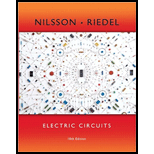
Electrical Circuits and Modified MasteringEngineering - With Access
10th Edition
ISBN: 9780133992793
Author: NILSSON
Publisher: PEARSON
expand_more
expand_more
format_list_bulleted
Concept explainers
Question
Chapter 5, Problem 8P
(a)
To determine
Design an inverting amplifier with a gain of 4 by using an ideal op amp with a feedback resistance of 30 kiloohms and
(b)
To determine
Determine the range of input voltages that will operate the op amp in its linear operating region designed in Part (a).
(c)
To determine
Find the largest value of feedback resistance to operate the op amp in its linear operating region when amplify a 2 V signal. Also find the new gain of the inverting amplifier with the calculated feedback resistance.
Expert Solution & Answer
Want to see the full answer?
Check out a sample textbook solution
Students have asked these similar questions
Please solve this question fully step by step handwritten and do not use chat gpt or any ai tools thanks
Please solve this question step by step hand written solution and do not use chat gpt or any ai tools thanks!
Please Solve this question step by step handwritten solution and do not use chat gpt or any ai tools thanks!
Chapter 5 Solutions
Electrical Circuits and Modified MasteringEngineering - With Access
Ch. 5.2 - Assume that the op amp in the circuit shown is...Ch. 5.3 - The source voltage vs in the circuit in Assessment...Ch. 5.4 - Find vo in the circuit shown if va = 0.1 V and vb...Ch. 5.5 - Assume that the op amp in the circuit shown is...Ch. 5.6 - In the difference amplifier shown, vb = 4.0 V....Ch. 5.7 - The inverting amplifier in the circuit shown has...Ch. 5 - Prob. 1PCh. 5 - Replace the 2 V source in the circuit in Fig. P5.1...Ch. 5 - Find iL (in milliamperes) in the circuit in Fig....Ch. 5 - The op amp in the circuit in Fig. P5.4 is...
Ch. 5 - Find io in the circuit in Fig. P5.3 if the op amp...Ch. 5 - The op amp in the circuit in Fig. P5.5 is ideal....Ch. 5 - Prob. 7PCh. 5 - Design an inverting amplifier with a gain of 4....Ch. 5 - Design an inverting amplifier with a gain of 2.5,...Ch. 5 - The op amp in the circuit shown in Fig. P5.11 is...Ch. 5 - The op amp in the circuit in Fig. P5.10 is...Ch. 5 - The op amp in Fig. P5.12 is ideal.
What circuit...Ch. 5 - Refer to the circuit in Fig. 5.12, where the op...Ch. 5 - The op amp in Fig. P5.14 is ideal. Find vo if va =...Ch. 5 - Prob. 15PCh. 5 - Design an inverting-summing amplifier using a 120...Ch. 5 - Design an inverting-summing amplifier so...Ch. 5 - Prob. 18PCh. 5 - The op amp in the circuit of Fig. P5.18 is...Ch. 5 - Prob. 20PCh. 5 - Prob. 21PCh. 5 - Prob. 22PCh. 5 - Prob. 23PCh. 5 - The circuit in Fig. P5.24 is a noninverting...Ch. 5 - Prob. 25PCh. 5 - The op amp in the circuit of Fig. P5.25 is...Ch. 5 - The resistors in the difference amplifier shown in...Ch. 5 - Prob. 28PCh. 5 - Prob. 29PCh. 5 - The op amp in the adder-subtracter circuit shown...Ch. 5 - Select the values of Rb and Rf in the circuit in...Ch. 5 - The op amp in the circuit of Fig. P5.34 is...Ch. 5 - Prob. 33PCh. 5 - In the difference amplifier shown in Fig. P5.34,...Ch. 5 - Prob. 36PCh. 5 - Show that when the ideal op amp in Fig. P5.38 is...Ch. 5 - Assume that the ideal op amp in the circuit seen...Ch. 5 - The two op amps in the circuit in Fig. P5.40 are...Ch. 5 - Assume that the ideal op amp in the circuit in...Ch. 5 - The op amps in the circuit in Fig. P5.39 are...Ch. 5 - The circuit inside the shaded area in Fig. P5.41...Ch. 5 - Derive Eq. 5.31.
(5.31)
Ch. 5 - Prob. 44PCh. 5 - Prob. 45PCh. 5 - Repeat Problem 5.45 assuming an ideal op...Ch. 5 - Prob. 47PCh. 5 - The op amp in the noninverting amplifier circuit...Ch. 5 - Suppose the strain gages in the bridge in Fig....Ch. 5 - For the circuit shown in Fig. P5.50, show that if...Ch. 5 - Prob. 51PCh. 5 - Prob. 52PCh. 5 - Prob. 53P
Knowledge Booster
Learn more about
Need a deep-dive on the concept behind this application? Look no further. Learn more about this topic, electrical-engineering and related others by exploring similar questions and additional content below.Similar questions
arrow_back_ios
SEE MORE QUESTIONS
arrow_forward_ios
Recommended textbooks for you
 Introductory Circuit Analysis (13th Edition)Electrical EngineeringISBN:9780133923605Author:Robert L. BoylestadPublisher:PEARSON
Introductory Circuit Analysis (13th Edition)Electrical EngineeringISBN:9780133923605Author:Robert L. BoylestadPublisher:PEARSON Delmar's Standard Textbook Of ElectricityElectrical EngineeringISBN:9781337900348Author:Stephen L. HermanPublisher:Cengage Learning
Delmar's Standard Textbook Of ElectricityElectrical EngineeringISBN:9781337900348Author:Stephen L. HermanPublisher:Cengage Learning Programmable Logic ControllersElectrical EngineeringISBN:9780073373843Author:Frank D. PetruzellaPublisher:McGraw-Hill Education
Programmable Logic ControllersElectrical EngineeringISBN:9780073373843Author:Frank D. PetruzellaPublisher:McGraw-Hill Education Fundamentals of Electric CircuitsElectrical EngineeringISBN:9780078028229Author:Charles K Alexander, Matthew SadikuPublisher:McGraw-Hill Education
Fundamentals of Electric CircuitsElectrical EngineeringISBN:9780078028229Author:Charles K Alexander, Matthew SadikuPublisher:McGraw-Hill Education Electric Circuits. (11th Edition)Electrical EngineeringISBN:9780134746968Author:James W. Nilsson, Susan RiedelPublisher:PEARSON
Electric Circuits. (11th Edition)Electrical EngineeringISBN:9780134746968Author:James W. Nilsson, Susan RiedelPublisher:PEARSON Engineering ElectromagneticsElectrical EngineeringISBN:9780078028151Author:Hayt, William H. (william Hart), Jr, BUCK, John A.Publisher:Mcgraw-hill Education,
Engineering ElectromagneticsElectrical EngineeringISBN:9780078028151Author:Hayt, William H. (william Hart), Jr, BUCK, John A.Publisher:Mcgraw-hill Education,

Introductory Circuit Analysis (13th Edition)
Electrical Engineering
ISBN:9780133923605
Author:Robert L. Boylestad
Publisher:PEARSON

Delmar's Standard Textbook Of Electricity
Electrical Engineering
ISBN:9781337900348
Author:Stephen L. Herman
Publisher:Cengage Learning

Programmable Logic Controllers
Electrical Engineering
ISBN:9780073373843
Author:Frank D. Petruzella
Publisher:McGraw-Hill Education

Fundamentals of Electric Circuits
Electrical Engineering
ISBN:9780078028229
Author:Charles K Alexander, Matthew Sadiku
Publisher:McGraw-Hill Education

Electric Circuits. (11th Edition)
Electrical Engineering
ISBN:9780134746968
Author:James W. Nilsson, Susan Riedel
Publisher:PEARSON

Engineering Electromagnetics
Electrical Engineering
ISBN:9780078028151
Author:Hayt, William H. (william Hart), Jr, BUCK, John A.
Publisher:Mcgraw-hill Education,
Electrical Engineering: Ch 5: Operational Amp (2 of 28) Inverting Amplifier-Basic Operation; Author: Michel van Biezen;https://www.youtube.com/watch?v=x2xxOKOTwM4;License: Standard YouTube License, CC-BY